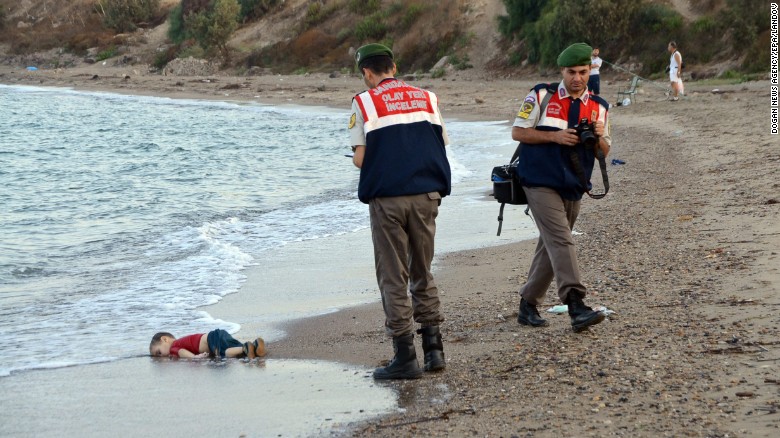
As the image of a dead three-year-old refugee boy, laying face down in the sand at the edge of the surf, gripped the world over the weekend, stories of compassion began to emerge.
Bryndis Bjorgvinsdottir, a young woman still living at home with her parents, scoffed at the Iceland government's offer to take in 50 refugees. She launched a Facebook page, saying a friend had opened his home to several families, and she would pay airfare for five people. Over the last few days, 11,000 Icelanders have offered to support refugees to resettle in their country, over and above the meager response of their government.
Iceland isn't alone in the paltry government response to the current refugee crisis. Not only are numbers low in many developed countries, including the US and Canada, but the processing time is so glacial that people die for lack of response. The family of the young boy above, who had relatives in Canada and had attempted to resettle in both Canada and the US, is among them. The boy, his mother, and brother all died as their inflatable raft deflated while they literally and unsuccessfully hung on for dear life.
On Canadian Broadcasting's Day Six, host Brent Bambury interviewed a middle-aged Vietnamese woman who, as an 11-year-old child traveling alone, was one of the earlier "boat people" that time from Vietnam. She had been sponsored to come to Canada, where she started a new life. She eventually became a professional, started her own business, and brought other family members, who also started businesses, to Canada.
For several years while I lived in North Carolina another of the Vietnamese boat people manicured my nails. She and her husband, also a boat person that she met in a refugee "tent city" in Hong Kong, also started a successful business and a family and became active in their community. They frequently hosted fund-raiser for one charitable cause of another.
In my lifetime, I recall the Vietnamese boat crisis and before that Cuban Mariel Boatlift, who risked their lives to make a run to Florida. Over 600,000 people, many lone children, resettled in the US. My pastor was about the same age as the girl above from Vietnam, when he too made the risky journey to the US. In 2013, he gave the invocation at President Obama's second inauguration.
Not so many years before I was born, 250,000 refugees were resettled in the US after World War II. Throughout the 19th Century, thousands of Jewish refugees of pogroms in Eastern Europe landed in the US to make a better, safer life for themselves and their families. They, their children, and grandchildren have become a who's who of the entertainment industry and the professions.
Also in the mid-19th Century, droves of Irish fled to the US to escape the "Potato Famine." In 1947 the city of Boston alone, then a city of 115,000, took in 37,000 immigrants, roughly one-third their population. In the same year, New York with a population of 372,000 took in 53,000 Germans. Even though it is easy to dismiss these surges with idyllic views of the 19th Century, a careful reading of history shows that the influxes were not painless.
As recently as last year, the US attempted to lock out or return thousands of refugees from gang violence in Central America. El Salvador is now known as the most dangerous country on earth. One of the leading presidential candidates disparages those attempting to come to the US as murders and rapists, rather than showing us a path to our compassionate roots.
Having slept restlessly Saturday night with aching for the thousands fleeing some of the worst monsters ever to walk this earth and our developed world's lack of gumption to do something to help, I entered an UberX vehicle Sunday morning and chatted with my driver, a man I would guess to be in his late 20s. He had come here from Ethiopia two and a half years ago. He was quick to tell me he was a Christian, signalling that he has probably been the brunt of the anti-Muslim prejudice that predominates this country. Running his own business, he told me his day begins at 4 a.m. on weekends, starting with people who are going to the airport. He generally works 14 hours on the weekend days.
As he dropped me at church, he asked that I pray for him. I felt like asking for him to pray for those of us who can't see the richness that comes to our country with industrious and talented immigrants like himself.
While one great-great grandmother was Native American, the rest of my ancestors were immigrants. In fact most of us in the US today are the descendants of immigrants. Many of their ancestors were in a similar situation to the current refugees, fleeing physical, emotional, cultural, religious, or physical persecution in their homelands. Yet there seems to be collective amnesia that there were people in this country that may have found the onslaught of their very own ancestors just as potentially unsettling as they do the current wave of refugees.
Every major religion has a belief that is somehow equivalent to the "Golden Rule"--do unto others as we would have them do unto us. Would we not want compassion if we were in inflatable rafts, risking life and limb to escape barbarians in our homelands? What has happened to our compassionate roots?
I am troubled about how I can make a difference, even as Pope Francis has called for every Catholic parish to take in a refugee family. Bryndis Bjorgvinsdottir has demonstrated once again what Margaret Mead showed us decades ago: "Never doubt that a small group of thoughtful, committed citizens can change the world; indeed, it's the only thing that ever has."